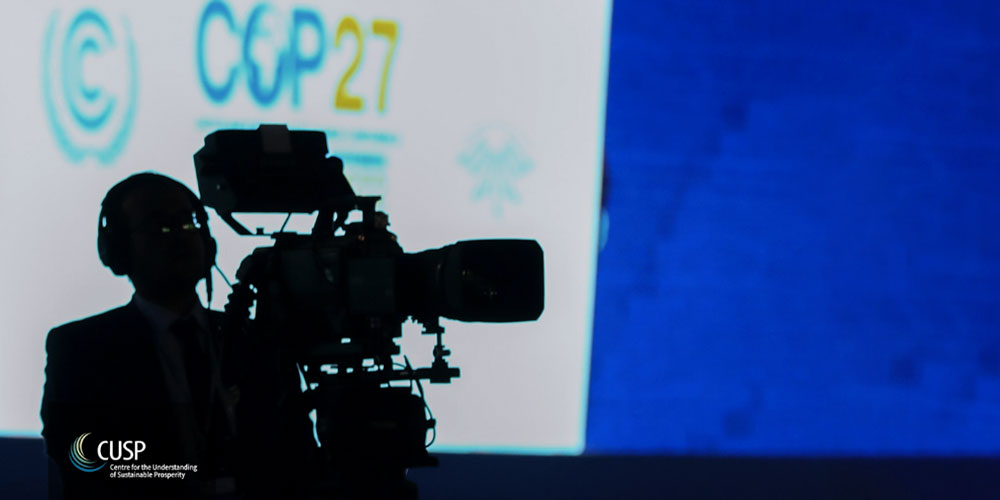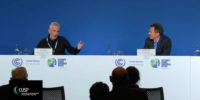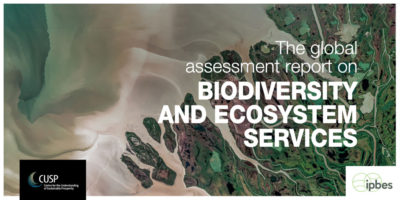The Truman COP
For many people, COP27 has left much to be desired. So long as money and profitability are dominating the conversations, Smith Mordak writes, we’re trapped in a Truman Show.
Blog by Smith Mordak

Imagine you’re at an international climate conference. Imagine it’s held in a giant dome, not like the millennium dome, or the Eden project dome, much bigger than those: a dome so big it feels like the whole world. Imagine that only certain ideas are conceivable within the dome. You can think about fashion, and coffee, and power games, and capital accumulation, but you can’t think about mycelial networks, or empathy, or ecological economics, or the dome. You have to get on with the business of climate change regardless of these limitations, and while you’re inside the dome, you don’t notice that ideas you might have been able to consider outside the dome aren’t popping into your head like usual.
The good news is that this is just a metaphor. COP27 was actually held in a series of boring, over-airconditioned temporary buildings, not a vast homage to The Truman Show. The bad news is that it seemed to me that you didn’t need to build a giant hemispherical firewall to radically impoverish the conversations. The really bad news is that “the business of climate change” is far too accurate a statement. COP27 as COP26 was as lousy with corporate advertising and rhetoric as a trade fair.
You are now entering the Blue Zone
I was the lucky holder of a ‘Blue Zone’ pass that meant I was able to attend and speak at events in the area only accessible to ministers, accredited government officials, and individuals accredited by the UNFCCC. This is where the negotiations take place together with pavilions from each country and other accredited organisations. As an architect, I spent a fair amount of time in the Buildings Pavilion.
The outcomes of the COP were inadequate, of course. The question is: why? Why is COP operating under a self-enforced ban on the kind of expansive imagination and deep empathy that might leave us with a better taste in our mouths than bitter frustration at ourselves for ever having hoped that things might actually be better? Why is “the business of climate change” not “the movement for climate action”?
Imagine you’re back in the dome. You can probably hear that the conversations around you are dominated by money. A lot of voices—all competing for attention—are saying subtle variations on the theme of “climate action is too expensive and not profitable enough” (or sometimes just “too expensive” which is even scarier because this underestimates the supremacy of the profit motive). But wait, there’s more, that’s just the set-up, they’re then talking about different financial vehicles they’ve invented to make climate action cheaper and more profitable. At this point you can probably hear the pitter patter chitter chatter of ‘demand aggregation’ and ‘market signals’ and ‘investor confidence’ and all the other obfuscations of financial extraction at the expense of ordinary people and the rest of nature. This is what COP seems to be about: waiting for ‘the market’ to absorb the talk of ‘adaptation risks’ and ‘stranded assets’ until it magically ‘matures’ (so patronising) into an economy that will use its invisible hand to scoop up the rising sea levels and pat down the melting ice caps and water the desertified soils and re-organise all the birds and bees into a habitat as enriching to the ecosystem as it is to the bank accounts of the owners of the means of healthy-climate-production.
The bad news is that this isn’t going to work. Obviously, we’re not going to profiteer our way to a regenerative home planet. The good news is that we aren’t actually limited to the ideas permissible in the dome. Like Truman Burbank, we can sail to the edge and touch our limits and then open the door and step out. Then what?
Is money a tool or an overlord?
Imagine you woke up tomorrow and there was no money. Not that you had no money, but that nobody had any money: money had stopped existing. Imagine there are still people and skills and equipment and networks and infrastructure and climate change and a desire to address climate change, just no money. Imagine we had to work together, under these moneyless circumstances, to make sure everyone had the resources to live a flourishing life, and to solve climate change. Imagine we had to work out how to mobilise the collaborative and productive capacity of humanity towards ensuring everyone has food and water and shelter and community and everything good. And that we had to do this in such a way that didn’t emit greenhouse gasses or pollute water courses or ravage ecosystems. It would be a huge logistical task, a colossal act of co-operation. It wouldn’t be easy, but the problem wouldn’t be money, the problem would be communication, organisation, and project management.
The good news is that we do have money. The bad news is that we do have money! Or rather that the fact that we do have money seems to be masking the real nature of our problem, which isn’t money, but how to distribute resources and remobilise our capacities to the necessary tasks at hand.
Imagine we stopped obsessing about how to make climate action cheaper and more profitable, and instead focused on how to provision ourselves in partnership with natural cycles. Imagine we could use money to support this endeavour, but we would be using it, it would not be using us! Imagine money circulated like everything else; like water and nutrients cycle, so too would money. (Isn’t that what a circular economy should really be about? Instead of an excuse to double down on economic growth by chasing the myth of absolute decoupling of resource and pollution intensity from money?)
Imagine you’ve just stepped out of the dome. You get a big head rush from all the ideas flooding in to your consciousness. Maybe you sit down. The good news is that ecological economics is one of those wonderful ideas. More than that, it’s a framework for ideas, it’s a super-rich ecosystem of possibilities. If the COP delegates were speaking from a worldview where the economy is nested within society itself nested within ecology, I really believe the bitter tastes would be limited to the bad coffee.
It’s 11 months until COP28. I’d forgive you for groaning and decrying any more attention be paid to these pointless circuses of ineffectual grandstanding. Well, the last 27 COPs may have been net zero useful but just as we might remobilise other ill-employed infrastructure, so too we might redeploy this unique international forum. It’s no good to us stuck in that dome though. How can we in the ecological economics community work together to help as many of the ministers, government officials, businesses, organisations, and individuals step out of the dome in time?



